

SUBSCRIBE TO OUR FREE NEWSLETTER
Daily news & progressive opinion—funded by the people, not the corporations—delivered straight to your inbox.
5
#000000
#FFFFFF
To donate by check, phone, or other method, see our More Ways to Give page.


Daily news & progressive opinion—funded by the people, not the corporations—delivered straight to your inbox.
The crisis of capital, the rise of the Occupy movement and the crash of Southern Europe have brought the problem of income inequality into mainstream consciousness in the West for the first time in many decades. Now everyone is talking about how the richest 1 percent have captured such a disproportionate share of wealth in their respective countries. This point came crashing home once again when an animated video, illustrating wealth disparities in the US, went viral last month. When an infographic catches the attention of tens of millions of internet users, you know it is hitting a nerve.
But the global scale of inequality remains largely absent from this story. So we at /The Rules decided to put together a video that would give it some attention.
While this information is not new, it is still startling. In the video we say that the richest 300 people on earth have more wealth than the poorest 3bn - almost half the world's population. We chose those numbers because it makes for a clear and memorable comparison, but in truth the situation is even worse: the richest 200 people have about $2.7 trillion, which is more than the poorest 3.5bn people, who have only $2.2 trillion combined. It is very difficult to wrap one's mind around such extreme figures.
Governments of rich countries constantly celebrate how much they spend in aid to developing countries, and multinational corporations splash CSR credentials across annual reports and product lines - neither of them confess how much they take out of developing countries.
But we wanted to do more than just illustrate the brutal extent of inequality; we also wanted to demonstrate that it has been getting progressively worse. A recent Oxfam report shows that "the richest 1 percent has increased its income by 60 percent in the last 20 years, with the financial crisis accelerating rather than slowing the process", while the income of the top 0.01 percent has seen even greater growth.
The video shows how this widening disparity operates between countries. During the colonial period, the gap between the richest countries and the poorest countries widened from 3:1 to 35:1, in part because European powers extracted so much wealth from the Global South in the form of resources and labour. Since then, that gap has grown to almost 80:1. How is this possible?
Capital flows from poor to rich
The gap is growing in part because of the neoliberal economic policies that international institutions like the World Bank, the International Monetary Fund (IMF) and the World Trade Organization (WTO) have imposed on developing countries over the past few decades. These policies are designed to forcibly liberalise markets, prying them open in order to give multinational corporations unprecedented access to cheap land, resources and labour. But at a serious cost: poor countries have lost around $500bn per year in GDP as a consequence of these policies, according to economist Robert Pollin of the University of Massachusetts.
As a result we see a clear net flow of wealth from poor places to rich places. We designed the video to help people visualise this flow, and to show how it pumps up the Global North at devastating expense to the Global South.
Few people know about this constant siphoning of wealth. One reason for this is that the discourse of aid takes up so much space. Consider the enormous publicity captured by Jeffrey Sachs and the Millennium Development Goals, or Bono and Bob Geldof, or even big charities such as Save the Children, Christian Aid and Action Aid.
Governments of rich countries constantly celebrate how much they spend in aid to developing countries, and multinational corporations splash CSR credentials across annual reports and product lines - neither of them confess how much they take out of developing countries.
The video highlights the fact that aid disbursements from rich to poor pale in comparison to the amount of capital that flows the other direction. Tax avoidance alone accounts for more than $900bn each year - money that corporations steal from developing countries and hide in tax havens (or thiefdoms, more accurately), of which the City of London is the global hub. Debt service accounts for about $600bn each year, much of it paid on the compound interest of illegitimate loans accumulated by dictators long since deposed. Both of these flows can be understood as direct transfusions of cash from poor to rich.
There is much more that we could have included in the video. Land grabs, for example: Fred Pearce's new book, The Land Grabbers, shows that land exceeding the size of Western Europe has been grabbed from developing countries by corporations in the past decade alone. If we could quantify the value of that land, we could have added a huge amount to the $2 trillion stack of cash that the video depicts flowing from poor to rich.
Or consider climate change: A 2 degree rise in global temperature will cost regions like Africa and South Asia about 5 percent of their GDP, much more than rich countries will suffer despite the fact that they bear most of the responsibility for causing this disaster. Losses on this level make aid seem insignificant.
These are the ultimate drivers of poverty and inequality. These are the problems that we need to tackle.
Democratic deficit
It bears pointing out that the geographic divide that the video depicts between the Global North and the Global South does not make as much sense today as it once did. We tried to show how both China and Russia embody this divide within their borders. But to be even more accurate we would have had to depict a small wealthy core of corporations and individuals - a global elite versus the majority of the world's people. It is no longer only about the West versus the Rest; the class divide is now internationally dispersed.
It remains true that the institutions that control the global economy (the World Bank, the IMF, the WTO and various bilateral Free Trade Agreements, or FTAs) are monopolised by Western countries. But that does not mean that they represent the interests of voters in those countries, for the people who run these institutions - central bankers, trade representatives and their corporate lobbyists - are not elected by any democratic process.
The World Bank and the IMF have the power to impose economic policies on developing countries even when voters and elected politicians in those countries unanimously reject them. On top of this, they enjoy "sovereign immunity" status that protects them from lawsuit when their loans fail and their policies cause economic crisis and human devastation.
The majority of the world's biggest economic entities are now corporations, not countries. They are run by CEOs who are unelected and unaccountable to any citizens; they are responsible only to their shareholders, and their mandate is to turn as much profit as possible at whatever cost to human life or the planet.
In other words, not only are these institutions undemocratic, they also trump local democracies and override the will of voters in independent nations. The people affected have no recourse to justice.
We see the same democratic deficit in corporations. The majority of the world's biggest economic entities are now corporations, not countries. They are run by CEOs who are unelected and unaccountable to any citizens; they are responsible only to their shareholders, and their mandate is to turn as much profit as possible at whatever cost to human life or the planet.
These corporations often have more power than the governments of the countries in which they operate. One reason for this is that the WTO and most FTAs enforce "investor-state dispute agreements" that allow corporations to sue local governments for legislation that compromises their profits, like minimum wage laws or pollution laws.
We need to change the rules
The point here is that corporate power regularly transcends national sovereignty. We have to face the fact that the democratic institutions we worked so hard to shore up during the 20th century are no longer sufficient to protect us in this brave new world.
We need to change the rules, and we need to do it quickly. Given that real power is now routinely wielded at the supra-national level, we need to start building global democratic capacity that can keep rampant greed and profiteering in check.
This might mean a global corporate minimum tax that will put an end to trade mispricing and tax havens. It might mean a global minimum wage that will put a floor on the "race to the bottom" for labour. It will certainly mean wresting control of international trade laws from the hands of IMF bankers and WTO technocrats and placing it under new institutions that are transparent and democratic.
If we are going to have a global economy, we need to have global democratic oversight. Can we accomplish this? Yes. And anyhow, we have no choice; the future of humanity, and of the planet, depends on it. They will say we are dreamers for demanding these changes. But the dreamers are those who imagine that we can feasibly carry on with the status quo.
Trump and Musk are on an unconstitutional rampage, aiming for virtually every corner of the federal government. These two right-wing billionaires are targeting nurses, scientists, teachers, daycare providers, judges, veterans, air traffic controllers, and nuclear safety inspectors. No one is safe. The food stamps program, Social Security, Medicare, and Medicaid are next. It’s an unprecedented disaster and a five-alarm fire, but there will be a reckoning. The people did not vote for this. The American people do not want this dystopian hellscape that hides behind claims of “efficiency.” Still, in reality, it is all a giveaway to corporate interests and the libertarian dreams of far-right oligarchs like Musk. Common Dreams is playing a vital role by reporting day and night on this orgy of corruption and greed, as well as what everyday people can do to organize and fight back. As a people-powered nonprofit news outlet, we cover issues the corporate media never will, but we can only continue with our readers’ support. |
The crisis of capital, the rise of the Occupy movement and the crash of Southern Europe have brought the problem of income inequality into mainstream consciousness in the West for the first time in many decades. Now everyone is talking about how the richest 1 percent have captured such a disproportionate share of wealth in their respective countries. This point came crashing home once again when an animated video, illustrating wealth disparities in the US, went viral last month. When an infographic catches the attention of tens of millions of internet users, you know it is hitting a nerve.
But the global scale of inequality remains largely absent from this story. So we at /The Rules decided to put together a video that would give it some attention.
While this information is not new, it is still startling. In the video we say that the richest 300 people on earth have more wealth than the poorest 3bn - almost half the world's population. We chose those numbers because it makes for a clear and memorable comparison, but in truth the situation is even worse: the richest 200 people have about $2.7 trillion, which is more than the poorest 3.5bn people, who have only $2.2 trillion combined. It is very difficult to wrap one's mind around such extreme figures.
Governments of rich countries constantly celebrate how much they spend in aid to developing countries, and multinational corporations splash CSR credentials across annual reports and product lines - neither of them confess how much they take out of developing countries.
But we wanted to do more than just illustrate the brutal extent of inequality; we also wanted to demonstrate that it has been getting progressively worse. A recent Oxfam report shows that "the richest 1 percent has increased its income by 60 percent in the last 20 years, with the financial crisis accelerating rather than slowing the process", while the income of the top 0.01 percent has seen even greater growth.
The video shows how this widening disparity operates between countries. During the colonial period, the gap between the richest countries and the poorest countries widened from 3:1 to 35:1, in part because European powers extracted so much wealth from the Global South in the form of resources and labour. Since then, that gap has grown to almost 80:1. How is this possible?
Capital flows from poor to rich
The gap is growing in part because of the neoliberal economic policies that international institutions like the World Bank, the International Monetary Fund (IMF) and the World Trade Organization (WTO) have imposed on developing countries over the past few decades. These policies are designed to forcibly liberalise markets, prying them open in order to give multinational corporations unprecedented access to cheap land, resources and labour. But at a serious cost: poor countries have lost around $500bn per year in GDP as a consequence of these policies, according to economist Robert Pollin of the University of Massachusetts.
As a result we see a clear net flow of wealth from poor places to rich places. We designed the video to help people visualise this flow, and to show how it pumps up the Global North at devastating expense to the Global South.
Few people know about this constant siphoning of wealth. One reason for this is that the discourse of aid takes up so much space. Consider the enormous publicity captured by Jeffrey Sachs and the Millennium Development Goals, or Bono and Bob Geldof, or even big charities such as Save the Children, Christian Aid and Action Aid.
Governments of rich countries constantly celebrate how much they spend in aid to developing countries, and multinational corporations splash CSR credentials across annual reports and product lines - neither of them confess how much they take out of developing countries.
The video highlights the fact that aid disbursements from rich to poor pale in comparison to the amount of capital that flows the other direction. Tax avoidance alone accounts for more than $900bn each year - money that corporations steal from developing countries and hide in tax havens (or thiefdoms, more accurately), of which the City of London is the global hub. Debt service accounts for about $600bn each year, much of it paid on the compound interest of illegitimate loans accumulated by dictators long since deposed. Both of these flows can be understood as direct transfusions of cash from poor to rich.
There is much more that we could have included in the video. Land grabs, for example: Fred Pearce's new book, The Land Grabbers, shows that land exceeding the size of Western Europe has been grabbed from developing countries by corporations in the past decade alone. If we could quantify the value of that land, we could have added a huge amount to the $2 trillion stack of cash that the video depicts flowing from poor to rich.
Or consider climate change: A 2 degree rise in global temperature will cost regions like Africa and South Asia about 5 percent of their GDP, much more than rich countries will suffer despite the fact that they bear most of the responsibility for causing this disaster. Losses on this level make aid seem insignificant.
These are the ultimate drivers of poverty and inequality. These are the problems that we need to tackle.
Democratic deficit
It bears pointing out that the geographic divide that the video depicts between the Global North and the Global South does not make as much sense today as it once did. We tried to show how both China and Russia embody this divide within their borders. But to be even more accurate we would have had to depict a small wealthy core of corporations and individuals - a global elite versus the majority of the world's people. It is no longer only about the West versus the Rest; the class divide is now internationally dispersed.
It remains true that the institutions that control the global economy (the World Bank, the IMF, the WTO and various bilateral Free Trade Agreements, or FTAs) are monopolised by Western countries. But that does not mean that they represent the interests of voters in those countries, for the people who run these institutions - central bankers, trade representatives and their corporate lobbyists - are not elected by any democratic process.
The World Bank and the IMF have the power to impose economic policies on developing countries even when voters and elected politicians in those countries unanimously reject them. On top of this, they enjoy "sovereign immunity" status that protects them from lawsuit when their loans fail and their policies cause economic crisis and human devastation.
The majority of the world's biggest economic entities are now corporations, not countries. They are run by CEOs who are unelected and unaccountable to any citizens; they are responsible only to their shareholders, and their mandate is to turn as much profit as possible at whatever cost to human life or the planet.
In other words, not only are these institutions undemocratic, they also trump local democracies and override the will of voters in independent nations. The people affected have no recourse to justice.
We see the same democratic deficit in corporations. The majority of the world's biggest economic entities are now corporations, not countries. They are run by CEOs who are unelected and unaccountable to any citizens; they are responsible only to their shareholders, and their mandate is to turn as much profit as possible at whatever cost to human life or the planet.
These corporations often have more power than the governments of the countries in which they operate. One reason for this is that the WTO and most FTAs enforce "investor-state dispute agreements" that allow corporations to sue local governments for legislation that compromises their profits, like minimum wage laws or pollution laws.
We need to change the rules
The point here is that corporate power regularly transcends national sovereignty. We have to face the fact that the democratic institutions we worked so hard to shore up during the 20th century are no longer sufficient to protect us in this brave new world.
We need to change the rules, and we need to do it quickly. Given that real power is now routinely wielded at the supra-national level, we need to start building global democratic capacity that can keep rampant greed and profiteering in check.
This might mean a global corporate minimum tax that will put an end to trade mispricing and tax havens. It might mean a global minimum wage that will put a floor on the "race to the bottom" for labour. It will certainly mean wresting control of international trade laws from the hands of IMF bankers and WTO technocrats and placing it under new institutions that are transparent and democratic.
If we are going to have a global economy, we need to have global democratic oversight. Can we accomplish this? Yes. And anyhow, we have no choice; the future of humanity, and of the planet, depends on it. They will say we are dreamers for demanding these changes. But the dreamers are those who imagine that we can feasibly carry on with the status quo.
The crisis of capital, the rise of the Occupy movement and the crash of Southern Europe have brought the problem of income inequality into mainstream consciousness in the West for the first time in many decades. Now everyone is talking about how the richest 1 percent have captured such a disproportionate share of wealth in their respective countries. This point came crashing home once again when an animated video, illustrating wealth disparities in the US, went viral last month. When an infographic catches the attention of tens of millions of internet users, you know it is hitting a nerve.
But the global scale of inequality remains largely absent from this story. So we at /The Rules decided to put together a video that would give it some attention.
While this information is not new, it is still startling. In the video we say that the richest 300 people on earth have more wealth than the poorest 3bn - almost half the world's population. We chose those numbers because it makes for a clear and memorable comparison, but in truth the situation is even worse: the richest 200 people have about $2.7 trillion, which is more than the poorest 3.5bn people, who have only $2.2 trillion combined. It is very difficult to wrap one's mind around such extreme figures.
Governments of rich countries constantly celebrate how much they spend in aid to developing countries, and multinational corporations splash CSR credentials across annual reports and product lines - neither of them confess how much they take out of developing countries.
But we wanted to do more than just illustrate the brutal extent of inequality; we also wanted to demonstrate that it has been getting progressively worse. A recent Oxfam report shows that "the richest 1 percent has increased its income by 60 percent in the last 20 years, with the financial crisis accelerating rather than slowing the process", while the income of the top 0.01 percent has seen even greater growth.
The video shows how this widening disparity operates between countries. During the colonial period, the gap between the richest countries and the poorest countries widened from 3:1 to 35:1, in part because European powers extracted so much wealth from the Global South in the form of resources and labour. Since then, that gap has grown to almost 80:1. How is this possible?
Capital flows from poor to rich
The gap is growing in part because of the neoliberal economic policies that international institutions like the World Bank, the International Monetary Fund (IMF) and the World Trade Organization (WTO) have imposed on developing countries over the past few decades. These policies are designed to forcibly liberalise markets, prying them open in order to give multinational corporations unprecedented access to cheap land, resources and labour. But at a serious cost: poor countries have lost around $500bn per year in GDP as a consequence of these policies, according to economist Robert Pollin of the University of Massachusetts.
As a result we see a clear net flow of wealth from poor places to rich places. We designed the video to help people visualise this flow, and to show how it pumps up the Global North at devastating expense to the Global South.
Few people know about this constant siphoning of wealth. One reason for this is that the discourse of aid takes up so much space. Consider the enormous publicity captured by Jeffrey Sachs and the Millennium Development Goals, or Bono and Bob Geldof, or even big charities such as Save the Children, Christian Aid and Action Aid.
Governments of rich countries constantly celebrate how much they spend in aid to developing countries, and multinational corporations splash CSR credentials across annual reports and product lines - neither of them confess how much they take out of developing countries.
The video highlights the fact that aid disbursements from rich to poor pale in comparison to the amount of capital that flows the other direction. Tax avoidance alone accounts for more than $900bn each year - money that corporations steal from developing countries and hide in tax havens (or thiefdoms, more accurately), of which the City of London is the global hub. Debt service accounts for about $600bn each year, much of it paid on the compound interest of illegitimate loans accumulated by dictators long since deposed. Both of these flows can be understood as direct transfusions of cash from poor to rich.
There is much more that we could have included in the video. Land grabs, for example: Fred Pearce's new book, The Land Grabbers, shows that land exceeding the size of Western Europe has been grabbed from developing countries by corporations in the past decade alone. If we could quantify the value of that land, we could have added a huge amount to the $2 trillion stack of cash that the video depicts flowing from poor to rich.
Or consider climate change: A 2 degree rise in global temperature will cost regions like Africa and South Asia about 5 percent of their GDP, much more than rich countries will suffer despite the fact that they bear most of the responsibility for causing this disaster. Losses on this level make aid seem insignificant.
These are the ultimate drivers of poverty and inequality. These are the problems that we need to tackle.
Democratic deficit
It bears pointing out that the geographic divide that the video depicts between the Global North and the Global South does not make as much sense today as it once did. We tried to show how both China and Russia embody this divide within their borders. But to be even more accurate we would have had to depict a small wealthy core of corporations and individuals - a global elite versus the majority of the world's people. It is no longer only about the West versus the Rest; the class divide is now internationally dispersed.
It remains true that the institutions that control the global economy (the World Bank, the IMF, the WTO and various bilateral Free Trade Agreements, or FTAs) are monopolised by Western countries. But that does not mean that they represent the interests of voters in those countries, for the people who run these institutions - central bankers, trade representatives and their corporate lobbyists - are not elected by any democratic process.
The World Bank and the IMF have the power to impose economic policies on developing countries even when voters and elected politicians in those countries unanimously reject them. On top of this, they enjoy "sovereign immunity" status that protects them from lawsuit when their loans fail and their policies cause economic crisis and human devastation.
The majority of the world's biggest economic entities are now corporations, not countries. They are run by CEOs who are unelected and unaccountable to any citizens; they are responsible only to their shareholders, and their mandate is to turn as much profit as possible at whatever cost to human life or the planet.
In other words, not only are these institutions undemocratic, they also trump local democracies and override the will of voters in independent nations. The people affected have no recourse to justice.
We see the same democratic deficit in corporations. The majority of the world's biggest economic entities are now corporations, not countries. They are run by CEOs who are unelected and unaccountable to any citizens; they are responsible only to their shareholders, and their mandate is to turn as much profit as possible at whatever cost to human life or the planet.
These corporations often have more power than the governments of the countries in which they operate. One reason for this is that the WTO and most FTAs enforce "investor-state dispute agreements" that allow corporations to sue local governments for legislation that compromises their profits, like minimum wage laws or pollution laws.
We need to change the rules
The point here is that corporate power regularly transcends national sovereignty. We have to face the fact that the democratic institutions we worked so hard to shore up during the 20th century are no longer sufficient to protect us in this brave new world.
We need to change the rules, and we need to do it quickly. Given that real power is now routinely wielded at the supra-national level, we need to start building global democratic capacity that can keep rampant greed and profiteering in check.
This might mean a global corporate minimum tax that will put an end to trade mispricing and tax havens. It might mean a global minimum wage that will put a floor on the "race to the bottom" for labour. It will certainly mean wresting control of international trade laws from the hands of IMF bankers and WTO technocrats and placing it under new institutions that are transparent and democratic.
If we are going to have a global economy, we need to have global democratic oversight. Can we accomplish this? Yes. And anyhow, we have no choice; the future of humanity, and of the planet, depends on it. They will say we are dreamers for demanding these changes. But the dreamers are those who imagine that we can feasibly carry on with the status quo.
"Thank you to the hundreds of thousands of Americans across the country who are standing up and speaking out for our voting rights, fundamental freedoms, and essential services like Social Security and Medicare."
In communities large and small across the United States on Saturday, hundreds of thousands of people collectively took to the streets to make their opposition to President Donald Trump heard.
The people who took part in the organized protests ranged from very young children to the elderly and their message was scrawled on signs of all sizes and colors—many of them angry, some of them funny, but all in line with the "Hands Off" message that brought them together.
"Thank you to the hundreds of thousands of Americans across the country who are standing up and speaking out for our voting rights, fundamental freedoms, and essential services like Social Security and Medicare," said the group Stand Up America as word of the turnout poured in from across the country.
A relatively small, but representative sample of photographs from various demonstrations that took place follows.
Demonstrators gather on Boston Common, cheering and chanting slogans, during the nationwide "Hands Off!" protest against US President Donald Trump and his advisor, Tesla CEO Elon Musk, in Boston, Massachusetts on April 5, 2025. (Photo by Joseph Prezioso / AFP)
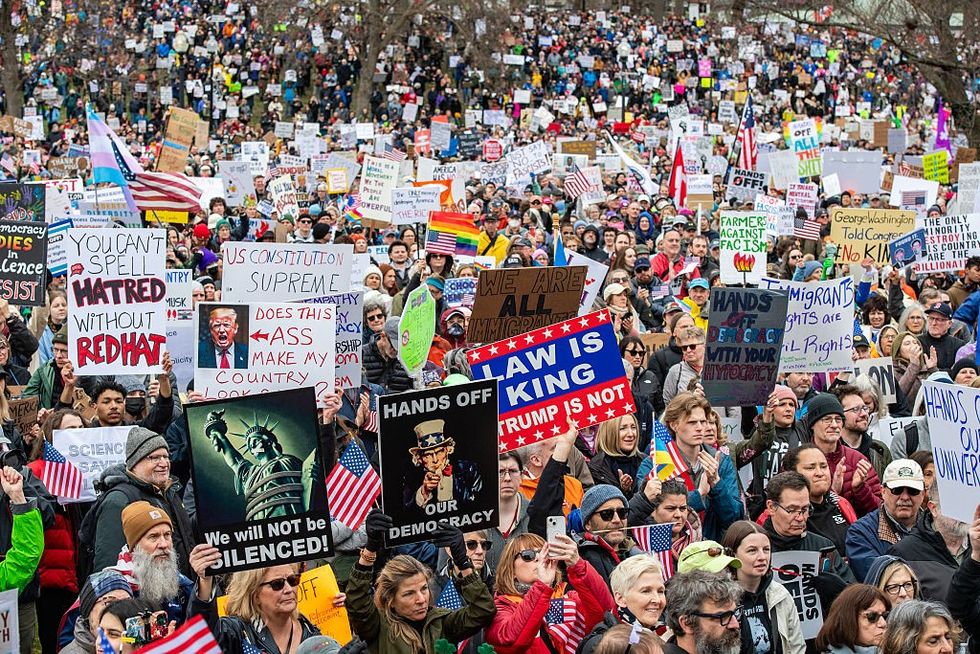
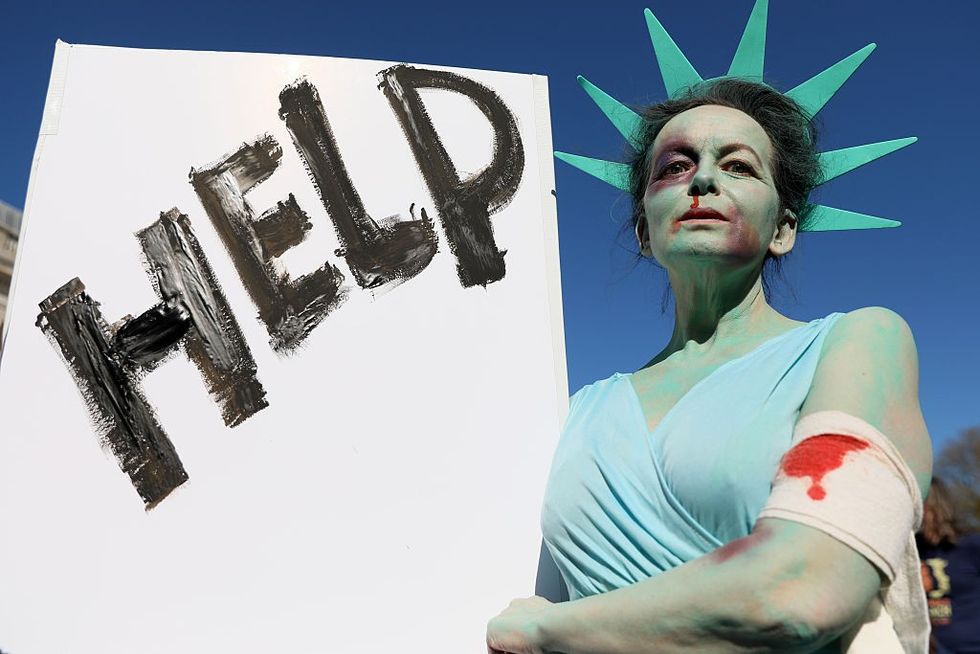
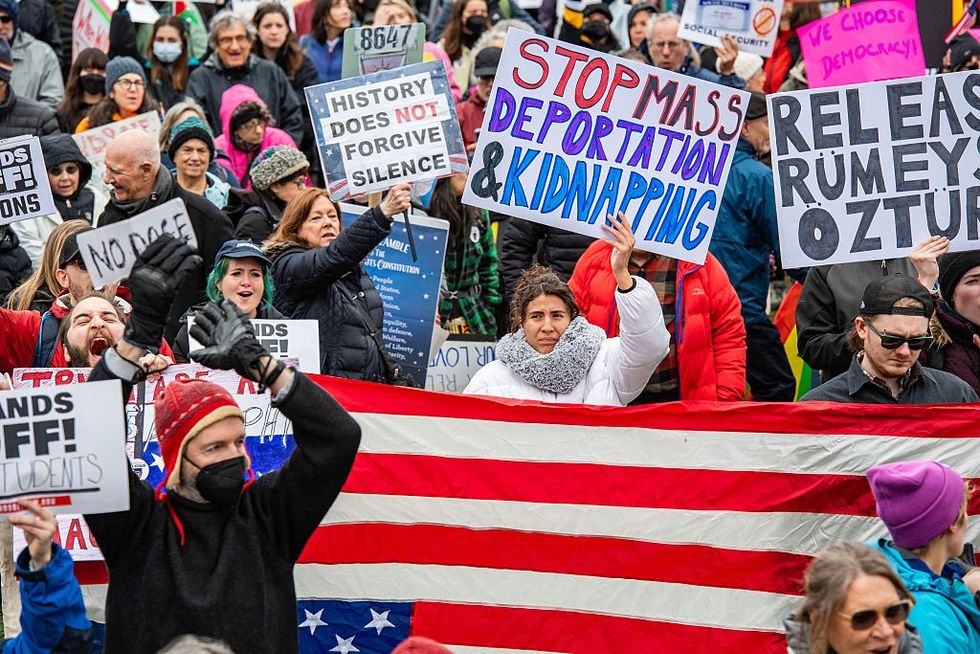
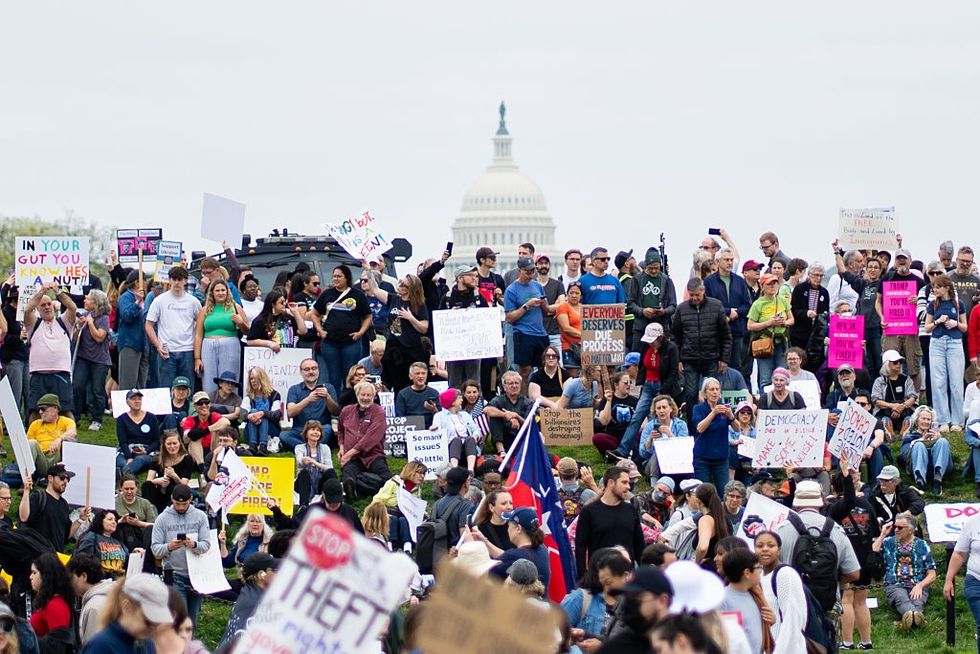
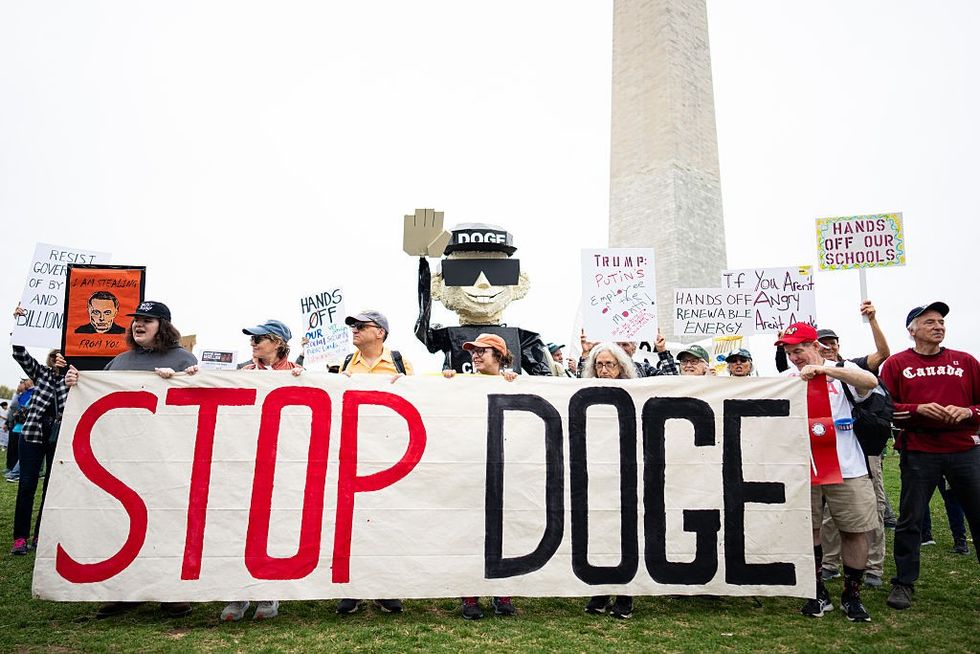
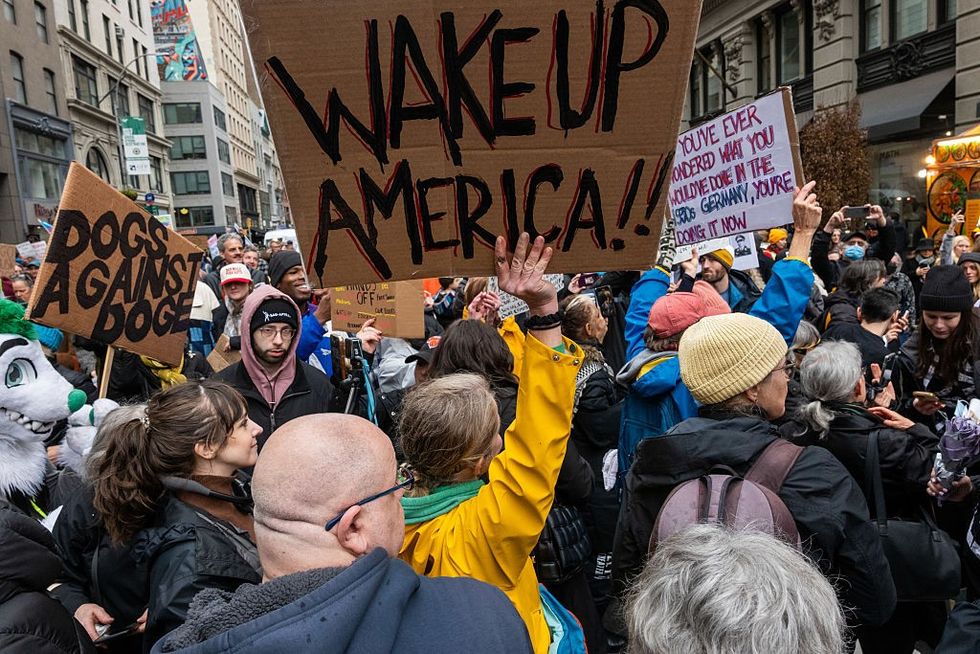
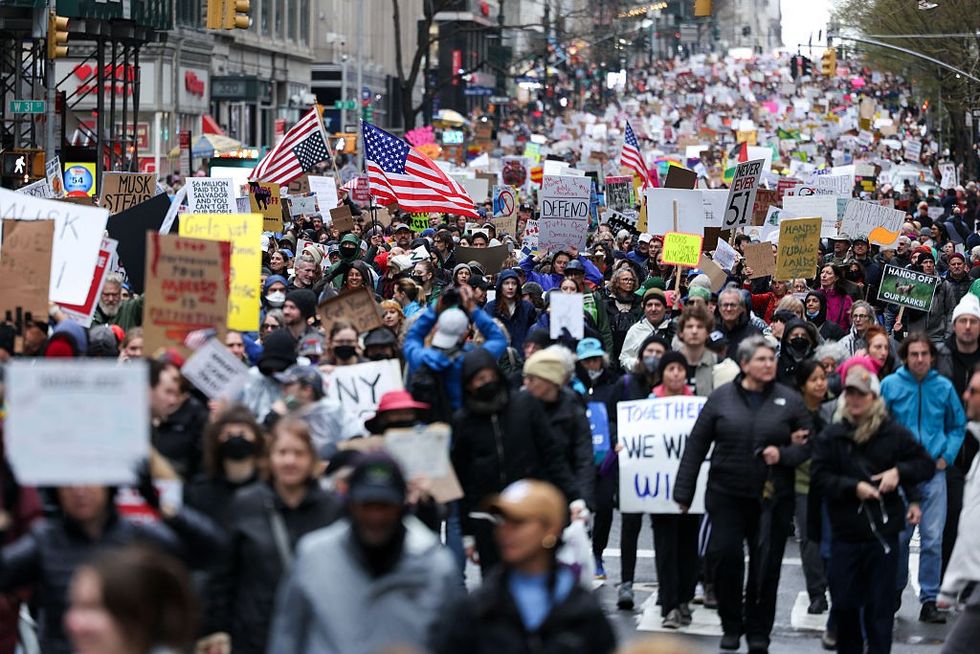
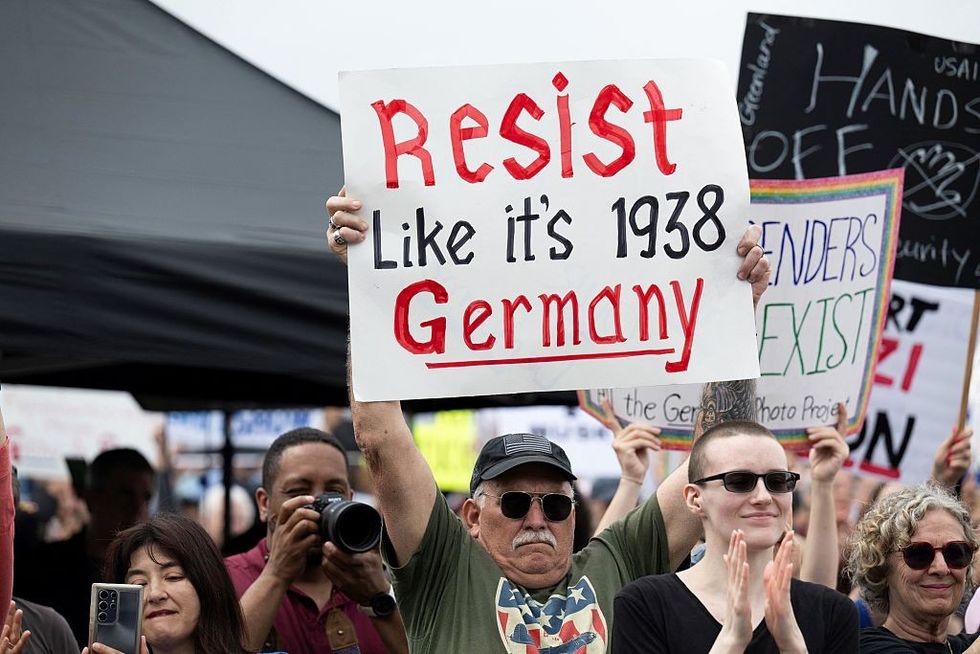
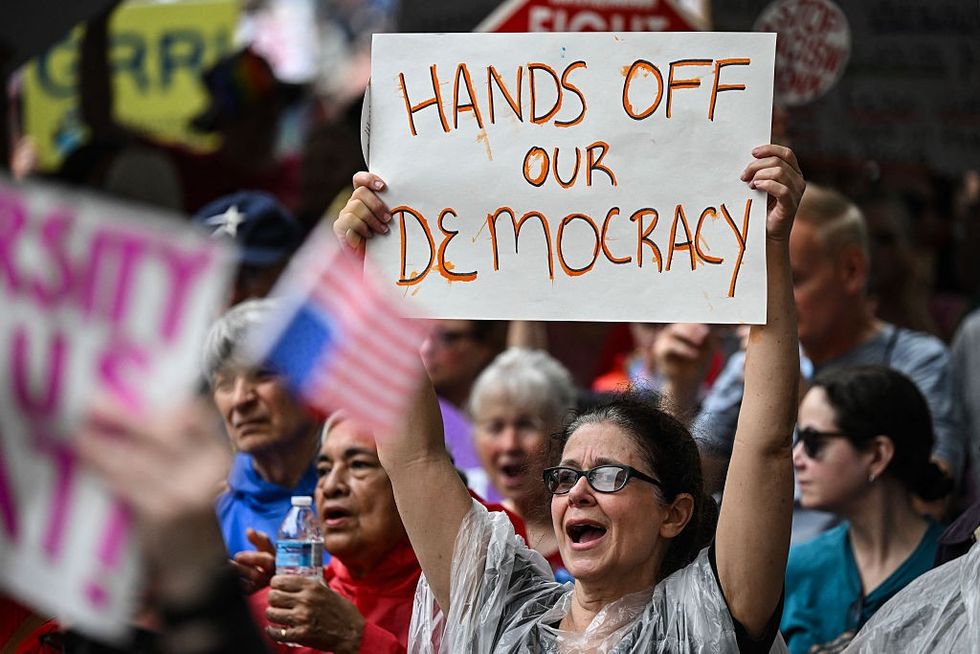
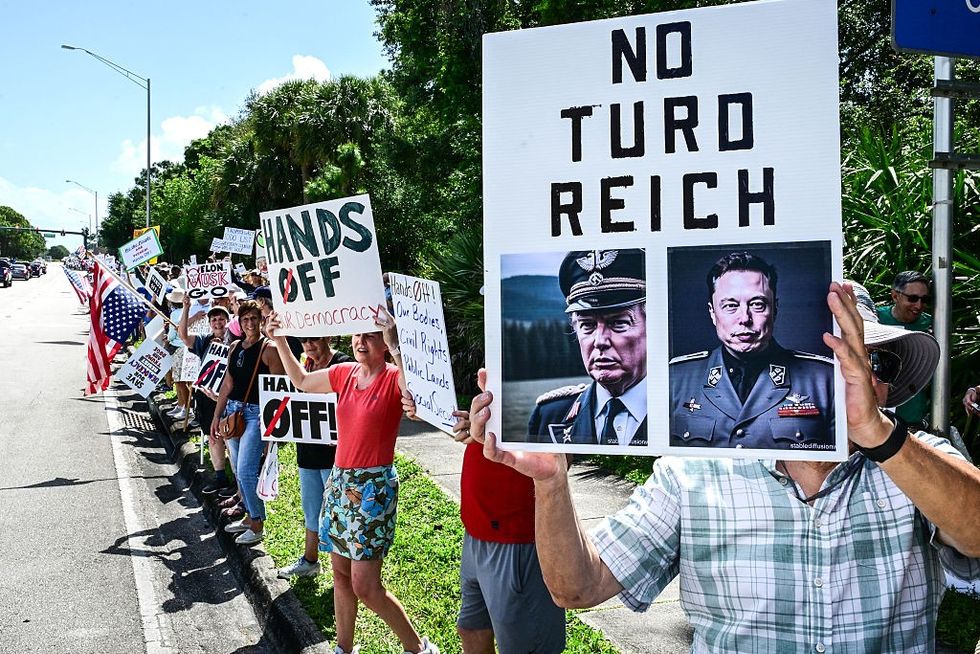
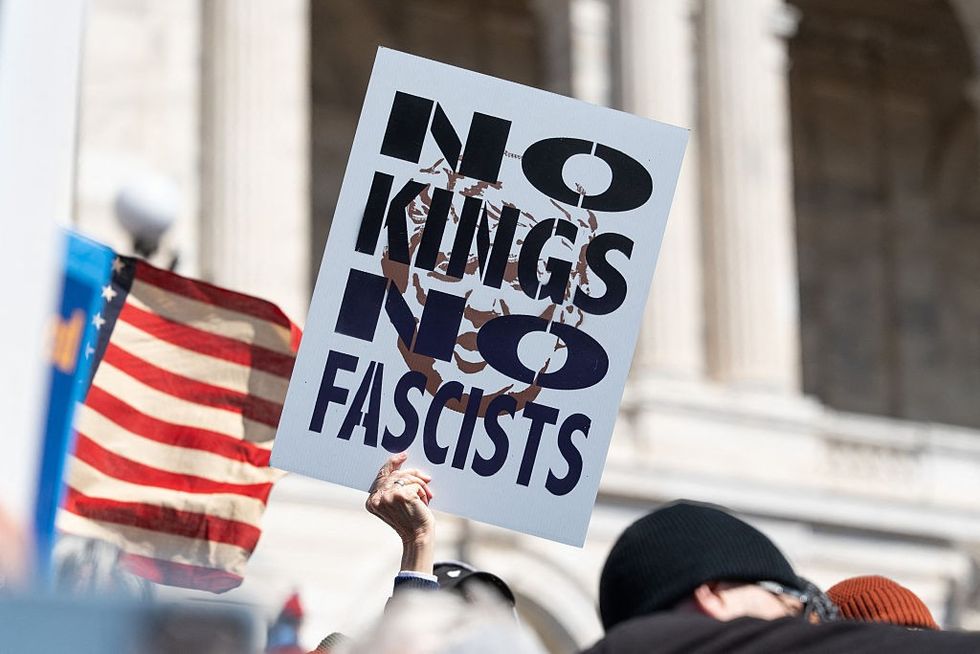
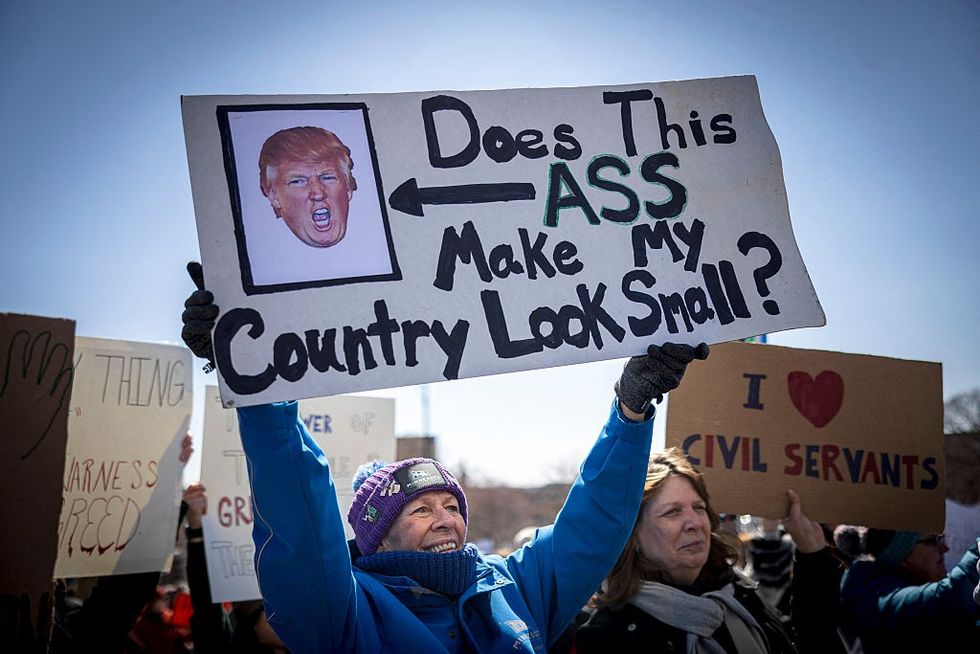
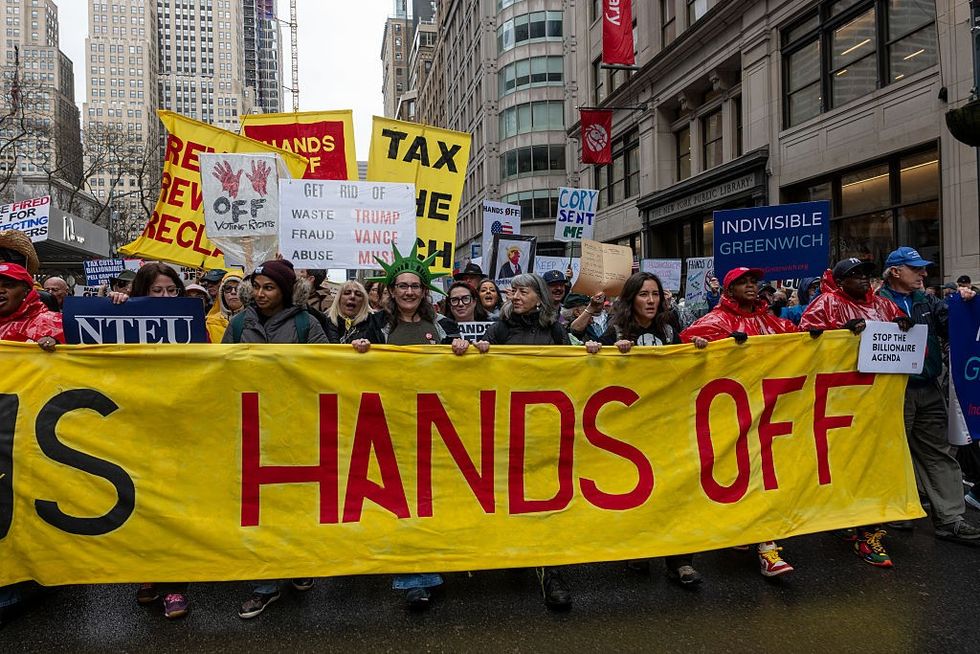
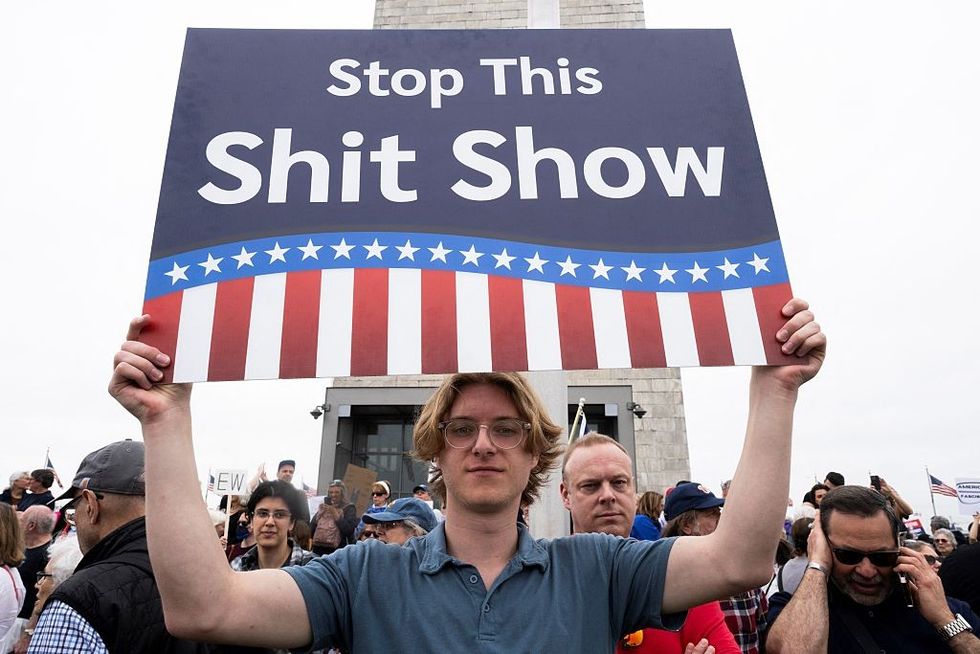
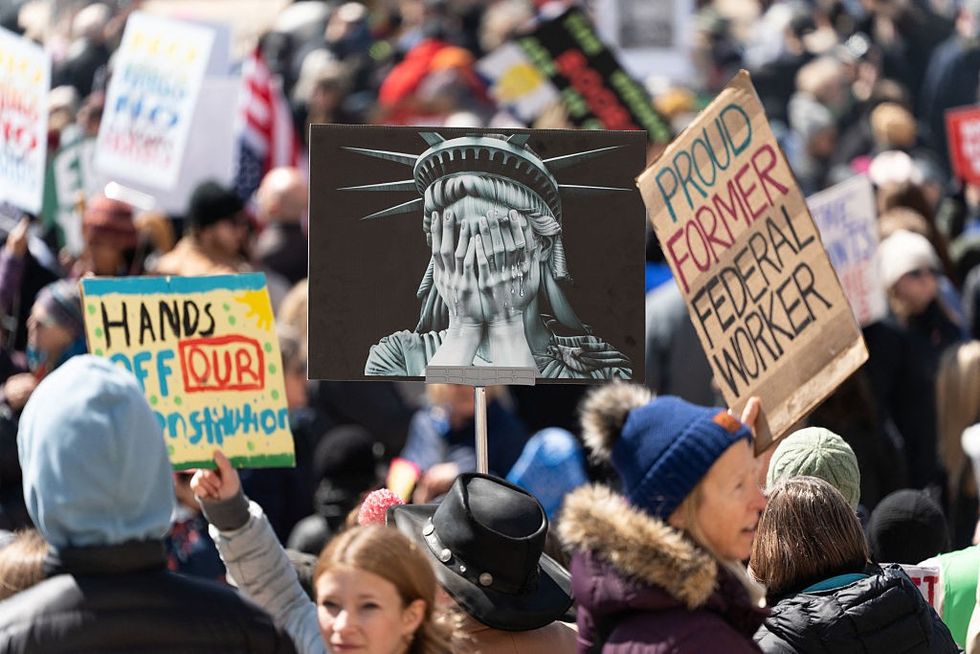
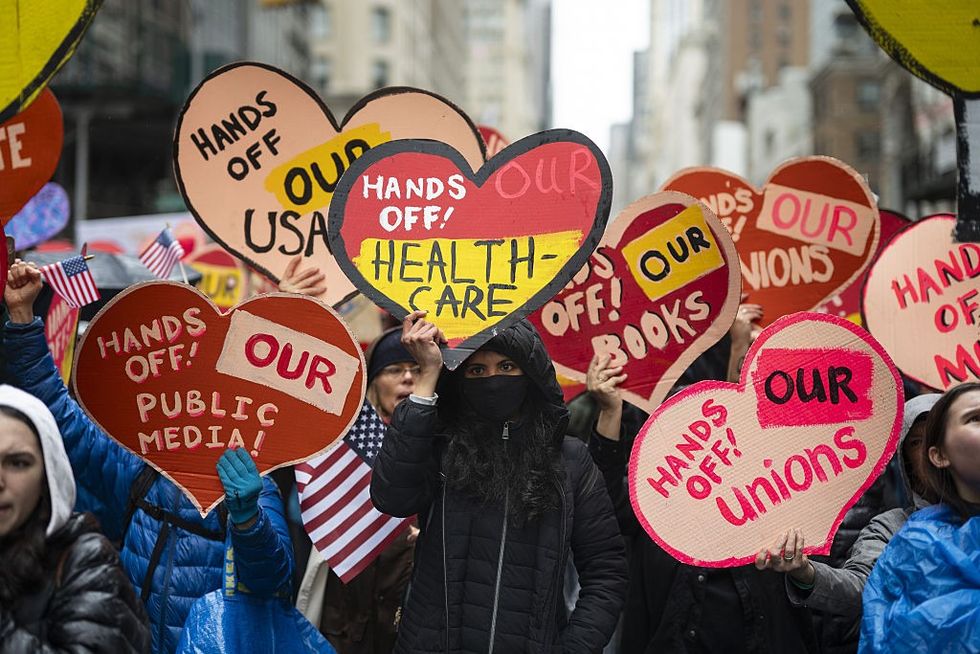
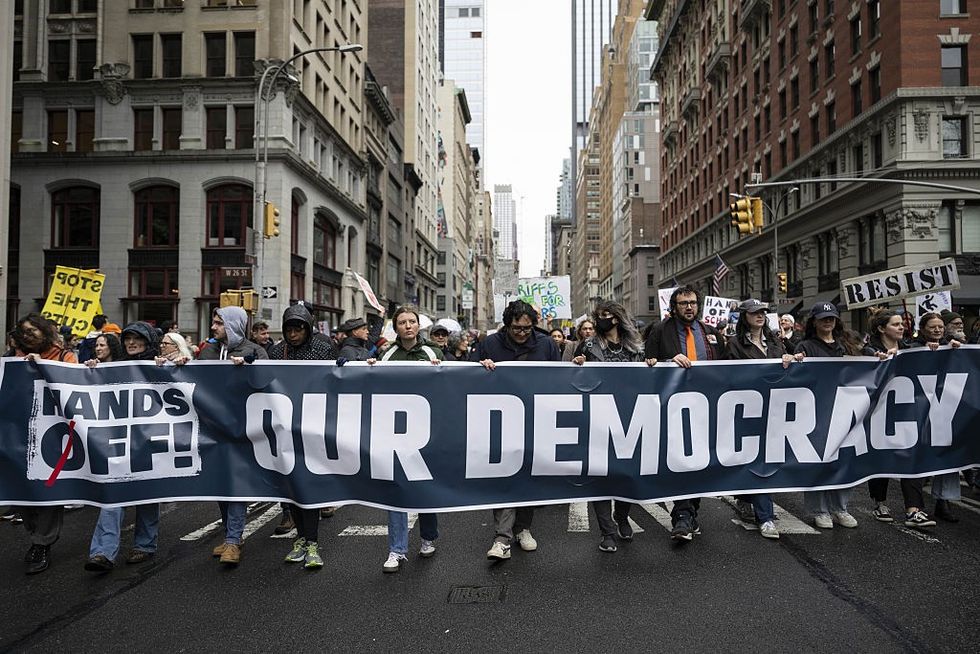
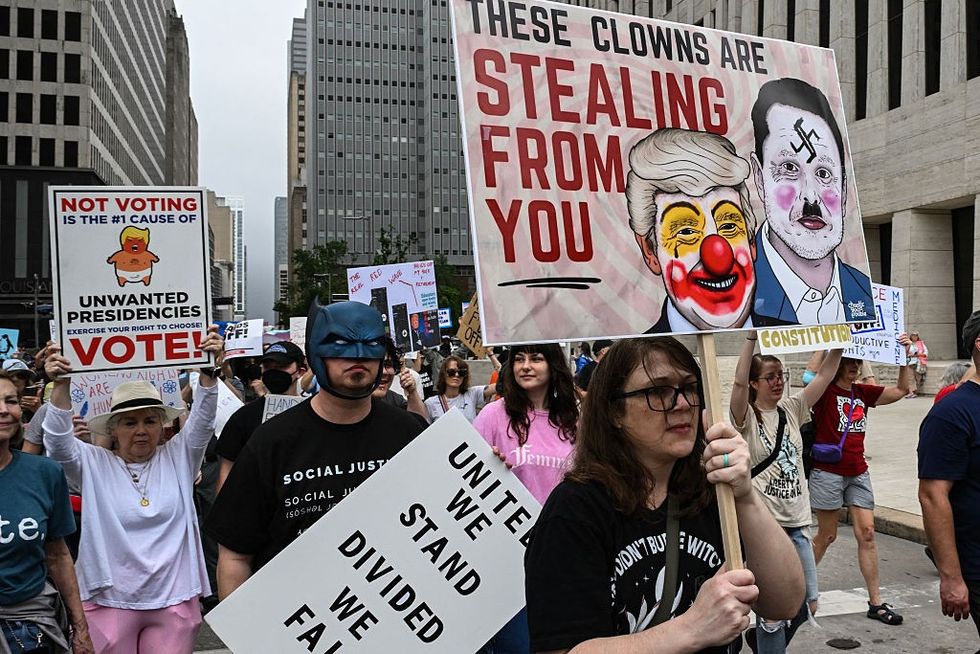
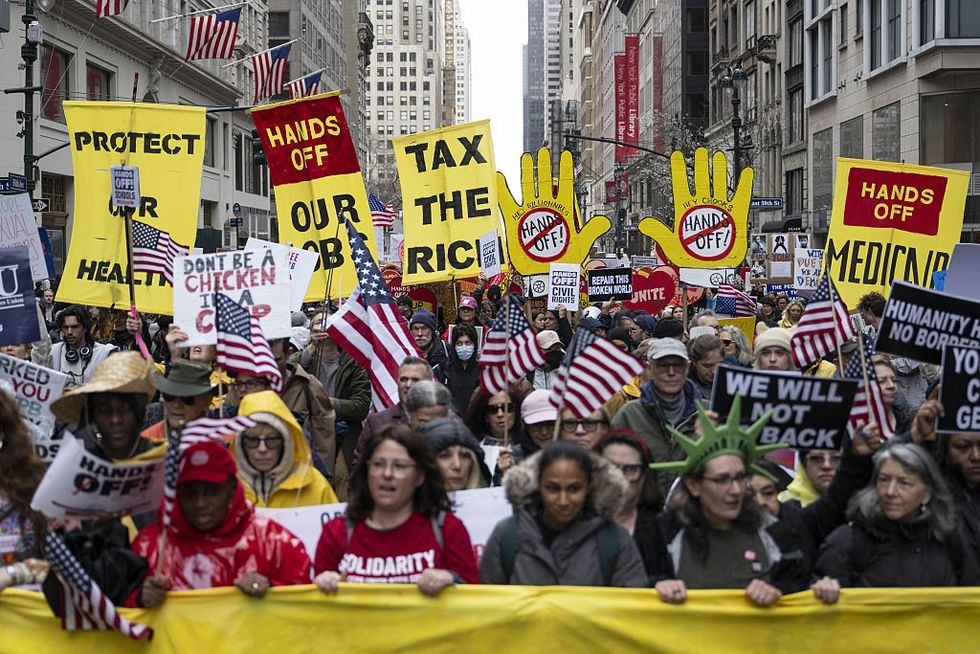
"Everyone involved in this crime against humanity, and everyone who covered it up, would face prosecution in a world that had any shred of dignity left."
A video presented to officials at the United Nations on Friday and first made public Saturday by the New York Times provides more evidence that the recent massacre of Palestinian medics in Gaza did not happen the way Israeli government claimed—the latest in a long line of deception when it comes to violence against civilians that have led to repeated accusations of war crimes.
The video, according to the Palestine Red Crescent Society (PRCS), was found on the phone of a paramedic found in a mass grave with a bullet in his head after being killed, along with seven other medics, by Israeli forces on March 23. The eight medics, buried in the shallow grave with the bodies riddled with bullets, were: Mustafa Khafaja, Ezz El-Din Shaat, Saleh Muammar, Refaat Radwan, Muhammad Bahloul, Ashraf Abu Libda, Muhammad Al-Hila, and Raed Al-Sharif. The video reportedly belonged to Radwan. A ninth medic, identified as Asaad Al-Nasasra, who was at the scene of the massacre, which took place near the southern city of Rafah, is still missing.
The PRCS said it presented the video—which refutes the explanation of the killings offered by Israeli officials—to members of the UN Security Council on Friday.
"They were killed in their uniforms. Driving their clearly marked vehicles. Wearing their gloves. On their way to save lives," Jonathan Whittall, head of the UN's humanitarian affairs office in Palestine, said last week after the bodies were discovered. Some of the victims, according to Gaza officials, were found with handcuffs still on them and appeared to have been shot in the head, execution-style.
The Israeli military initially said its soldiers "did not randomly attack" any ambulances, but rather claimed they fired on "terrorists" who approached them in "suspicious vehicles." Lt. Col. Nadav Shoshani, an IDF spokesperson, said the vehicles that the soldiers opened fire on were driving with their lights off and did not have clearance to be in the area. The video evidence directly contradicts the IDF's version of events.
As the Times reports:
The Times obtained the video from a senior diplomat at the United Nations who asked not to be identified to be able to share sensitive information.
The Times verified the location and timing of the video, which was taken in the southern city of Rafah early on March 23. Filmed from what appears to be the front interior of a moving vehicle, it shows a convoy of ambulances and a fire truck, clearly marked, with headlights and flashing lights turned on, driving south on a road to the north of Rafah in the early morning. The first rays of sun can be seen, and birds are chirping.
In an interview with Drop Site News published Friday, the only known paramedic to survive the attack, Munther Abed, explained that he and his colleagues "were directly and deliberately shot at" by the IDF. "The car is clearly marked with 'Palestinian Red Crescent Society 101.' The car's number was clear and the crews' uniform was clear, so why were we directly shot at? That is the question."
The video's release sparked fresh outrage and demands for accountability on Saturday.
"The IDF denied access to the site for days; they sent in diggers to cover up the massacre and intentionally lied about it," said podcast producer Hamza M. Syed in reaction to the new revelations. "The entire leadership of the Israeli army is implicated in this unconscionable war crime. And they must be prosecuted."
"Everyone involved in this crime against humanity, and everyone who covered it up, would face prosecution in a world that had any shred of dignity left," said journalist Ryan Grim of DropSite News.
"They're dismantling our country. They're looting our government. And they think we'll just watch."
In communities across the United States and also overseas, coordinated "Hands Off" protests are taking place far and wide Saturday in the largest public rebuke yet to President Donald Trump and top henchman Elon Musk's assault on the workings of the federal government and their program of economic sabotage that is sacrificing the needs of working families to authoritarianism and the greed of right-wing oligarchs.
Indivisible, one of the key organizing groups behind the day's protests, said millions participated in more than 1,300 individual rallies as they demanded "an end to Trump's authoritarian power grab" and condemning all those aiding and abetting it.
"We expected hundreds of thousands. But at virtually every single event, the crowds eclipsed our estimates," the group said in a statement Saturday evening.
"Hands off our healthcare, hands off our civil rights, hands off our schools, our freedoms, and our democracy."
"This is the largest day of protest since Trump retook office," the group added. "And in many small towns and cities, activists are reporting the biggest protests their communities have ever seen as everyday people send a clear, unmistakable message to Trump and Musk: Hands off our healthcare, hands off our civil rights, hands off our schools, our freedoms, and our democracy."
According to the organizers' call to action:
They're dismantling our country. They’re looting our government. And they think we'll just watch.
On Saturday, April 5th, we rise up with one demand: Hands Off!
This is a nationwide mobilization to stop the most brazen power grab in modern history. Trump, Musk, and their billionaire cronies are orchestrating an all-out assault on our government, our economy, and our basic rights—enabled by Congress every step of the way. They want to strip America for parts—shuttering Social Security offices, firing essential workers, eliminating consumer protections, and gutting Medicaid—all to bankroll their billionaire tax scam.
They're handing over our tax dollars, our public services, and our democracy to the ultra-rich. If we don't fight now, there won’t be anything left to save.
The more than 1,300 "Hands Off!" demonstrations—organized by a large coalition of unions, progressive advocacy groups, and pro-democracy watchdogs—first kicked off Saturday in Europe, followed by East Coast communities in the U.S., and continued throughout the day at various times, depending on location. See here for a list of scheduled "Hands Off" events.
"The United States has a president, not a king," said the progressive advocacy group People's Action, one of the group's involved in the actions, in an email to supporters Saturday morning just as protest events kicked off in hundreds of cities and communities. "Donald Trump has, by every measure, been working to make himself a king. He has become unanswerable to the courts, Congress, and the American people."
In its Saturday evening statement, Indivisible said the actions far exceeded their expectations and should be seen as a turning point in the battle to stop Trump and his minions:
The Trump administration has spent its first 75 days in office trying to overwhelm us, to make us feel powerless, so that we will fall in line, accept the ransacking of our government, the raiding of our social safety net, and the dismantling of our democracy.
And too often, the response from our leaders and those in positions to resist has been abject cowardice. Compliance. Obeying in advance.
But not today. Today we've demonstrated a different path forward. We've modeled the courage and action that we want to see from our leaders, and showed all those who've been standing on the sidelines who share our values that they are not alone.
Citing the Republican president's thirst for "power and greed," People's Action earlier explained why organized pressure must be built and sustained against the administration, especially at the conclusion of a week in which the global economy was spun into disarray by Trump's tariff announcement, his attack on the rule of law continued, and the twice-elected president admitted he was "not joking" about the possibility of seeking a third term, which is barred by the constitution.
"He is destroying the economy with tariffs in order to pay for the tax cuts he wants to push through to enrich himself and his billionaire buddies," warned People's Action. "He has ordered the government to round up innocent people off of the streets and put them in detention centers without due process because they dared to speak out using their First Amendment rights. And he is not close to being done—by his own admission, he is planning to run for a third term, which the Constitution does not allow."
Live stream of Hands Off rally in Washington, D.C.:
Below are photo or video dispatches from demonstrations around the world on Saturday. Check back for updates...
United Kingdom
France
Germany
Belgium:
Massachusetts:
Maine:
Washington, D.C.:
New York:
Minnesota:
Michigan:
Ohio:
Colorado:
Pennsylvania:
North Carolina:
The protest organizers warn that what Trump and Musk are up to "is not just corruption" and "not just mismanagement," but something far more sinister.
"This is a hostile takeover," they said, but vowed to fight back. "This is the moment where we say NO. No more looting, no more stealing, no more billionaires raiding our government while working people struggle to survive."